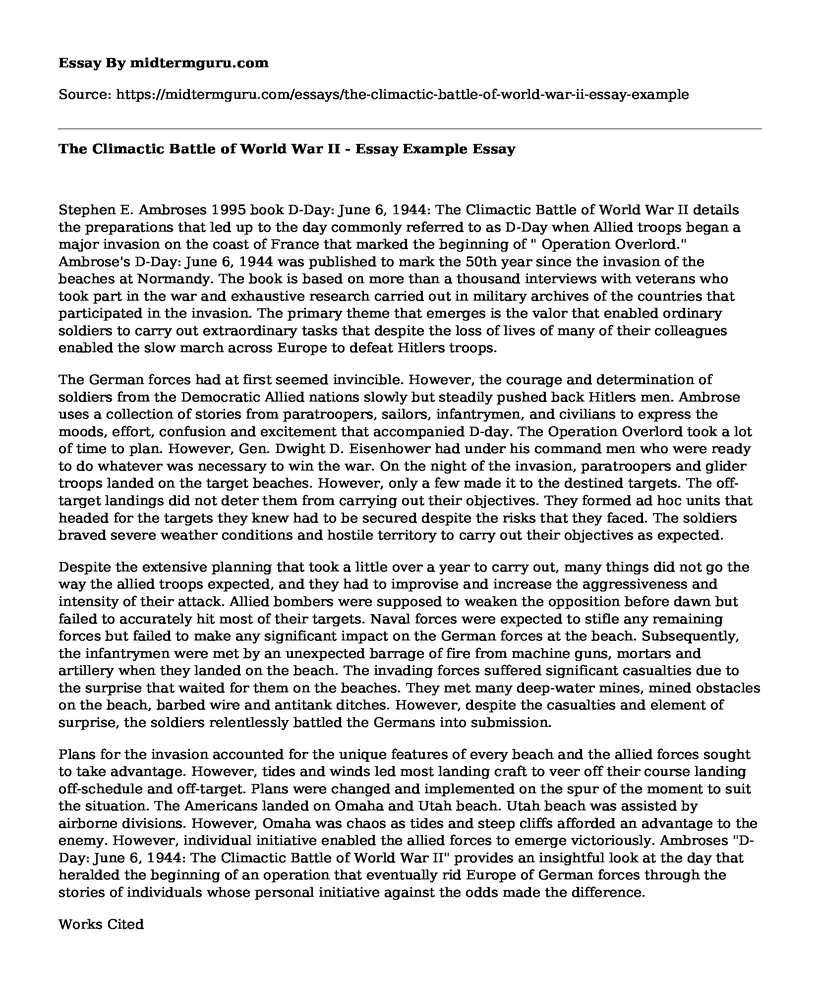Stephen E. Ambroses 1995 book D-Day: June 6, 1944: The Climactic Battle of World War II details the preparations that led up to the day commonly referred to as D-Day when Allied troops began a major invasion on the coast of France that marked the beginning of " Operation Overlord." Ambrose's D-Day: June 6, 1944 was published to mark the 50th year since the invasion of the beaches at Normandy. The book is based on more than a thousand interviews with veterans who took part in the war and exhaustive research carried out in military archives of the countries that participated in the invasion. The primary theme that emerges is the valor that enabled ordinary soldiers to carry out extraordinary tasks that despite the loss of lives of many of their colleagues enabled the slow march across Europe to defeat Hitlers troops.
The German forces had at first seemed invincible. However, the courage and determination of soldiers from the Democratic Allied nations slowly but steadily pushed back Hitlers men. Ambrose uses a collection of stories from paratroopers, sailors, infantrymen, and civilians to express the moods, effort, confusion and excitement that accompanied D-day. The Operation Overlord took a lot of time to plan. However, Gen. Dwight D. Eisenhower had under his command men who were ready to do whatever was necessary to win the war. On the night of the invasion, paratroopers and glider troops landed on the target beaches. However, only a few made it to the destined targets. The off-target landings did not deter them from carrying out their objectives. They formed ad hoc units that headed for the targets they knew had to be secured despite the risks that they faced. The soldiers braved severe weather conditions and hostile territory to carry out their objectives as expected.
Despite the extensive planning that took a little over a year to carry out, many things did not go the way the allied troops expected, and they had to improvise and increase the aggressiveness and intensity of their attack. Allied bombers were supposed to weaken the opposition before dawn but failed to accurately hit most of their targets. Naval forces were expected to stifle any remaining forces but failed to make any significant impact on the German forces at the beach. Subsequently, the infantrymen were met by an unexpected barrage of fire from machine guns, mortars and artillery when they landed on the beach. The invading forces suffered significant casualties due to the surprise that waited for them on the beaches. They met many deep-water mines, mined obstacles on the beach, barbed wire and antitank ditches. However, despite the casualties and element of surprise, the soldiers relentlessly battled the Germans into submission.
Plans for the invasion accounted for the unique features of every beach and the allied forces sought to take advantage. However, tides and winds led most landing craft to veer off their course landing off-schedule and off-target. Plans were changed and implemented on the spur of the moment to suit the situation. The Americans landed on Omaha and Utah beach. Utah beach was assisted by airborne divisions. However, Omaha was chaos as tides and steep cliffs afforded an advantage to the enemy. However, individual initiative enabled the allied forces to emerge victoriously. Ambroses "D-Day: June 6, 1944: The Climactic Battle of World War II" provides an insightful look at the day that heralded the beginning of an operation that eventually rid Europe of German forces through the stories of individuals whose personal initiative against the odds made the difference.
Works Cited
Ambrose, Stephen E. D-day: 6 June 1944 - the Climactic Battle of World War Ii. Scribner's and
Sons, 1995
Cite this page
The Climactic Battle of World War II - Essay Example. (2021, Jun 01). Retrieved from https://midtermguru.com/essays/the-climactic-battle-of-world-war-ii-essay-example
If you are the original author of this essay and no longer wish to have it published on the midtermguru.com website, please click below to request its removal:
- Review of Roanoke the Abandoned Colony - Paper Example
- Paper on History Example: World War I
- Historical Significance of Harriet Tubman - Essay Example
- Essay on Dealing With Terrorism: Operation Inherent Resolve
- The Role of Mohandas Gandhi in Indian Politics - Essay Example
- Spanish Civil War: The 3-Year Conflict Between 1936-1939 - Essay Sample
- Book Analysis Essay on Street Without Joy by Bernard Fall







